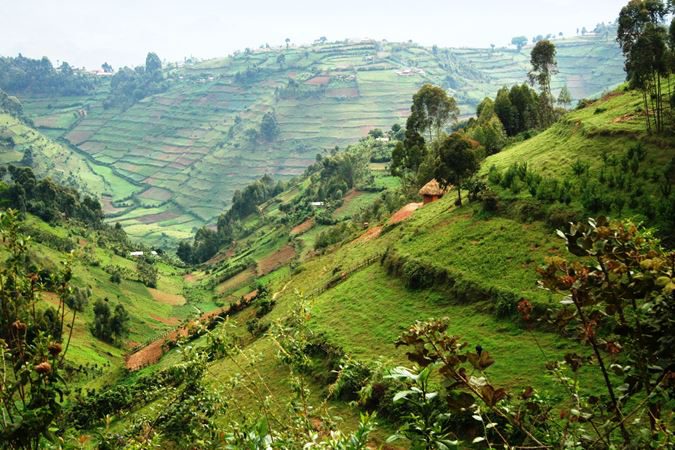Environmental Economic Empowerment Initiatives in Rwanda
Driven by Green Policy & Strategic Vision
Rwanda has woven environmental stewardship into its economic development agenda. Central to this effort is the National Green Growth and Climate Resilience Strategy (GGCRS), launched in 2011 and updated in 2023, which positions climate-smart growth as a national priority. The Rwanda Green Fund (FONERWA), operational since 2012, has mobilized hundreds of millions of dollars to support over 45 sustainable projects, creating more than 160,000 green jobs.
Rwanda’s membership in the Partnership for Action on Green Economy (PAGE) further accelerates this vision by promoting inclusive green job creation, strengthened livelihoods, and climate-resilient investment.
Youth Eco‑Brigade & Terracing for Soil Resilience
The Youth Ecobrigade Program, led by UNDP in partnership with Rwanda’s ministries and KOICA, trains rural youth in environmental techniques such as radical and progressive terracing, bamboo buffer zones along the Nyabarongo River, financial literacy, and cooperative management.
In just its first year (2019–2020), the initiative created over 3,500 green jobs, mobilized youth savings of about 11 million RWF, and built hundreds of hectares of terraces and bamboo buffer zones.
Participants such as Jeannette and Mitsindo used their earnings to start businesses in poultry, livestock, and hair salons, improving incomes and household opportunities.
This model demonstrates how environmental rehabilitation can generate dignified, market-linked livelihoods for young people.
Green Gicumbi: Climate‑Resilient Settlements & Forest Restoration
The Green Gicumbi Project, launched in 2019 by the Ministry of Environment with FONERWA support, aims to build climate‑resilient rural villages and restore degraded ecosystems in northern Rwanda.
The project has built hundreds of green, climate‑resilient houses for the most vulnerable families and provided cows and horticulture support to turn residents into productive farmers.
So far, more than 1,100 ha of degraded forests have been rehabilitated, and nearly 20,000 clean cookstoves distributed—reducing pressure on forests, cutting carbon emissions, and improving health.
The project helps communities transition to sustainable livelihoods via farming and forest-linked income opportunities
Women‑Led Water Access & Rainwater Harvesting
In the foothills of Volcanoes National Park, the Imbereheza Gahunga women’s cooperative—partnering with Wild Earth Allies—constructs household rainwater tanks, bringing safe water to rural families while reducing human–gorilla contact
To date, nearly 300 tanks have served over 2,000 people, significantly reducing waterborne illness, improving school attendance, and increasing time for income-generating activities.
The initiative has catalyzed revolving loan funds, enabling better agricultural output and economic resilience for women-headed households.
Inkomoko: Supporting Green and Inclusive Entrepreneurship
Inkomoko, a social enterprise founded in Rwanda in 2012, provides business training and affordable finance to micro‑entrepreneurs—particularly refugees, women, and youth.
By mid‑2025, Inkomoko had supported over 100,000 businesses, disbursed more than $24M in loans, fostered 60,000+ jobs, and enabled 70% average revenue growth within six months.
Over 60% of its clients are women, and many businesses tackle environmentally oriented or green value chains—spanning clean energy, recycling, food processing, and sustainable farming.
The model helps entrepreneurs graduate to commercial finance, reinforcing long-term resilience and private-sector growth
Green Economy & Circular Business Opportunities
Rwanda’s Circular Economy Action Plan (launched in 2022) and policymaking through RDB and REMA offer investment opportunities in sectors such as organic fertilizer, recycling, nature-based restoration, waste valorization, clean cooking, and green packaging.
These opportunities align with the government’s climate targets: reducing emissions by 38% by 2030 and becoming carbon neutral by 2050.
A Tempered yet Promising Future
While Rwanda is building momentum through these initiatives, challenges remain. Cold chain development—vital for reducing post‐harvest losses and boosting farmer income—is hampered by high operating costs and limited technical capacity, despite the launch of ACES (Africa Centre for Sustainable Cooling) in 2020.
Scaling environmentally based entrepreneurship will also require strengthened infrastructure, financial inclusion, training, and local ownership. Yet, Rwanda’s integrated approach—combining policy innovation with grassroots empowerment—is an encouraging blueprint for green economic growth.
Conclusion: Green Jobs, Resilience, and Inclusive Growth
In Rwanda, environmental protection is not a bolt-on—it’s an engine for social and economic empowerment. From terraced hillsides to women-built rainwater systems, and youth ecobrigades to circular economy startups, these initiatives demonstrate how sustainability and livelihoods can thrive hand in hand.
As Rwanda pursues Vision 2050, its blend of climate-smart planning, community-focused action, and green entrepreneurship sets a clear path: environmental stewardship as the foundation for inclusive prosperity.




